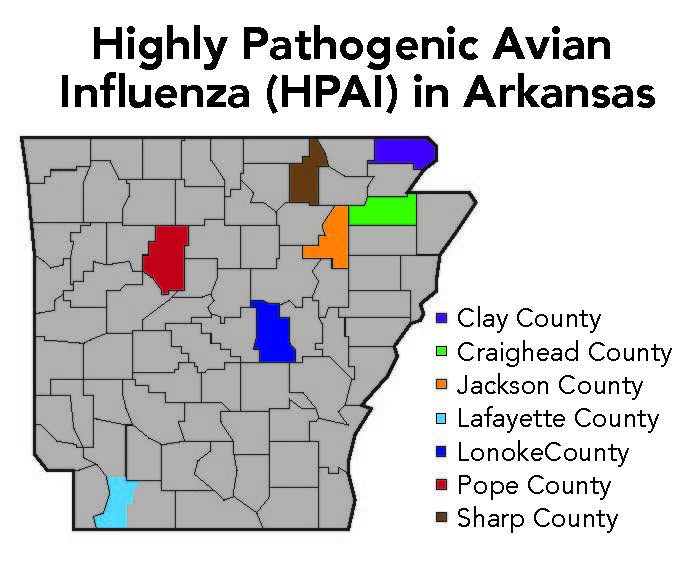A case of Avian Flu has been confirmed in Sharp County. Sharp County Extension Agent Cody Stroud said in total, there are six cases confirmed statewide.
“There are six cases across the state in six counties and Sharp County happened to fall on that list this time,” Stroud said. “The case in Sharp County was a back yard flock, near the Lawrence County line and it has been neutralized. The main thing going forward is trying to minimize the spread. There are lots of ways to keep your flock healthy and help keep this from spreading.”
According to Occupational Safety and Health Administration (OSHA), there are many signs and symptoms associated with bird flu including: “Sudden death; lack of energy, appetite, and coordination; purple discoloration and/or swelling of various body parts; diarrhea; nasal discharge; coughing; sneezing; and reduced egg production and/or soft-shelled or misshapen eggs.
With as many confirmed incases including one impacting a commercial flock, some who work in the poultry industry have expressed concern of spread. Stroud said preventing the spread of the disease just requires good stewardship.
“A lot of it is common sense. Right now we don’t need to co-mingle birds, share tools, poultry supplies or other items with other flock owners. You need to clean and disinfect your equipment and vehicles. The main thing is to keep everyign clean and separate if you can,” Stroud said.
For those who work with large volumes of birds, OSHA also has safety tips for those in the industry of growing, and those who process birds.
“Avian Flu symptoms in humans range from fever, cough, sore throat and muscle aches to
nausea, abdominal pain, vomiting, diarrhea, eye infections, difficulty breathing, pneumonia and severe respiratory disease. Symptoms may depend on which virus caused the infection but are often similar to those of human seasonal influenza,” OSHA said. “When engaged in depopulation activities: Wash hands thoroughly (for at least 15 seconds) and frequently, preferably with soap and water (or an alcohol-based hand rub, if soap and water are not available); Wear lightweight, disposable gloves or heavy-duty rubber work gloves that can be disinfected; Avoid touching your face with gloved hands. Wash hands after removing gloves and other personal protective equipment (PPE); Wear disposable outer garments, coveralls or surgical gowns with long, cuffed sleeves and with a sealed apron; • Wear disposable shoe covers or boots that can be cleaned and disinfected; Wear safety goggles and disposable head or hair cover; • Wear at least the minimum level of respiratory protection, an N95 or higher respirator; and avoid eating, drinking, smoking and bathroom use while wearing PPE.”
If you suspect you may have an bird showing signs of Avian Flu, Stroud said you may contact your home county extension office, the USDA hotline at 1-888-MPHotline (1-888-674-6854) or the Arkansas Livestock and Poultry at (501) 225-1598.
Stroud also noted now is not the time to be relocating birds.
“Try to stay away from other birds and now is not the time to be bringing birds in,” Stroud said.
Lauren is a an award-winning journalist who decided after 10 years of newspaper experience to venture out. Hallmark Times was born.






